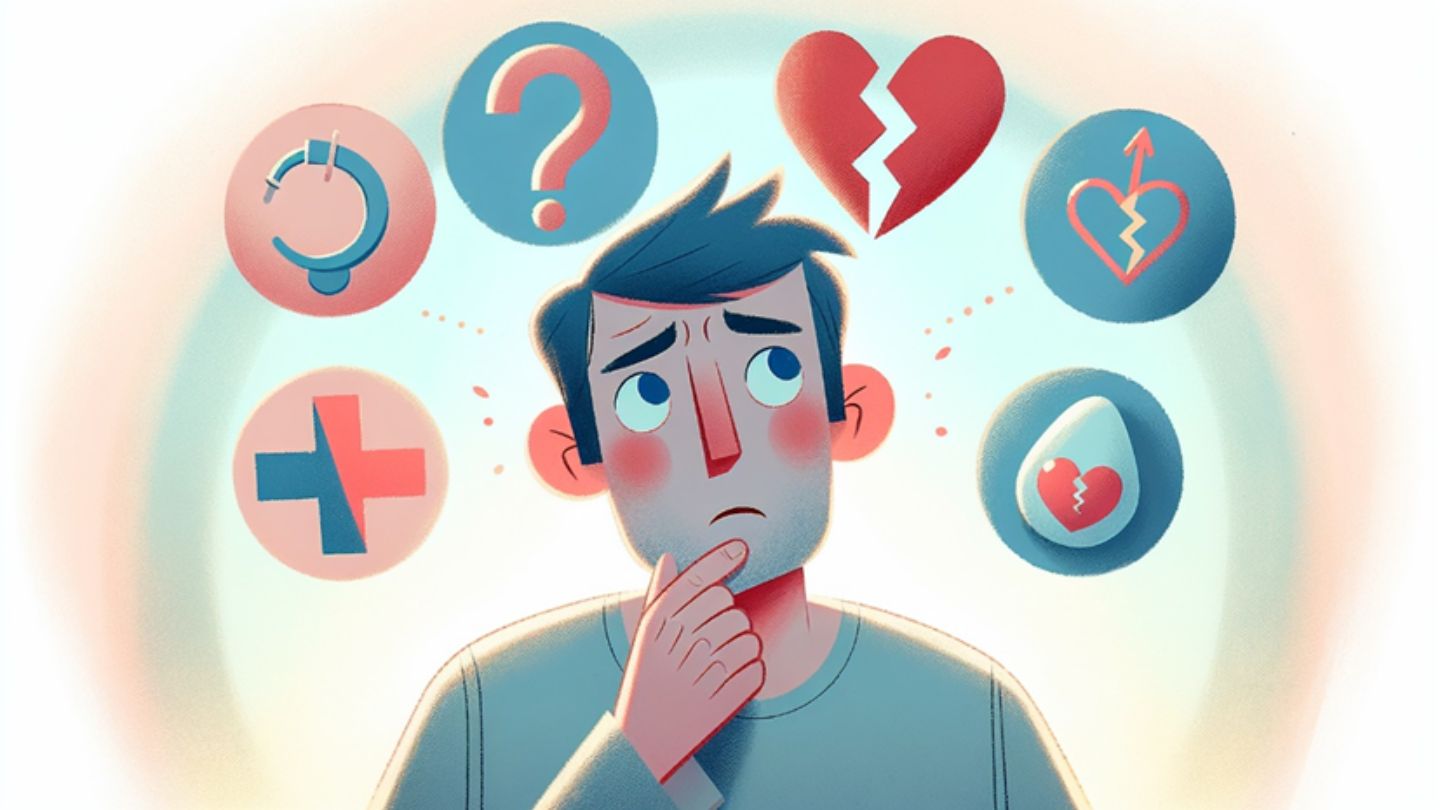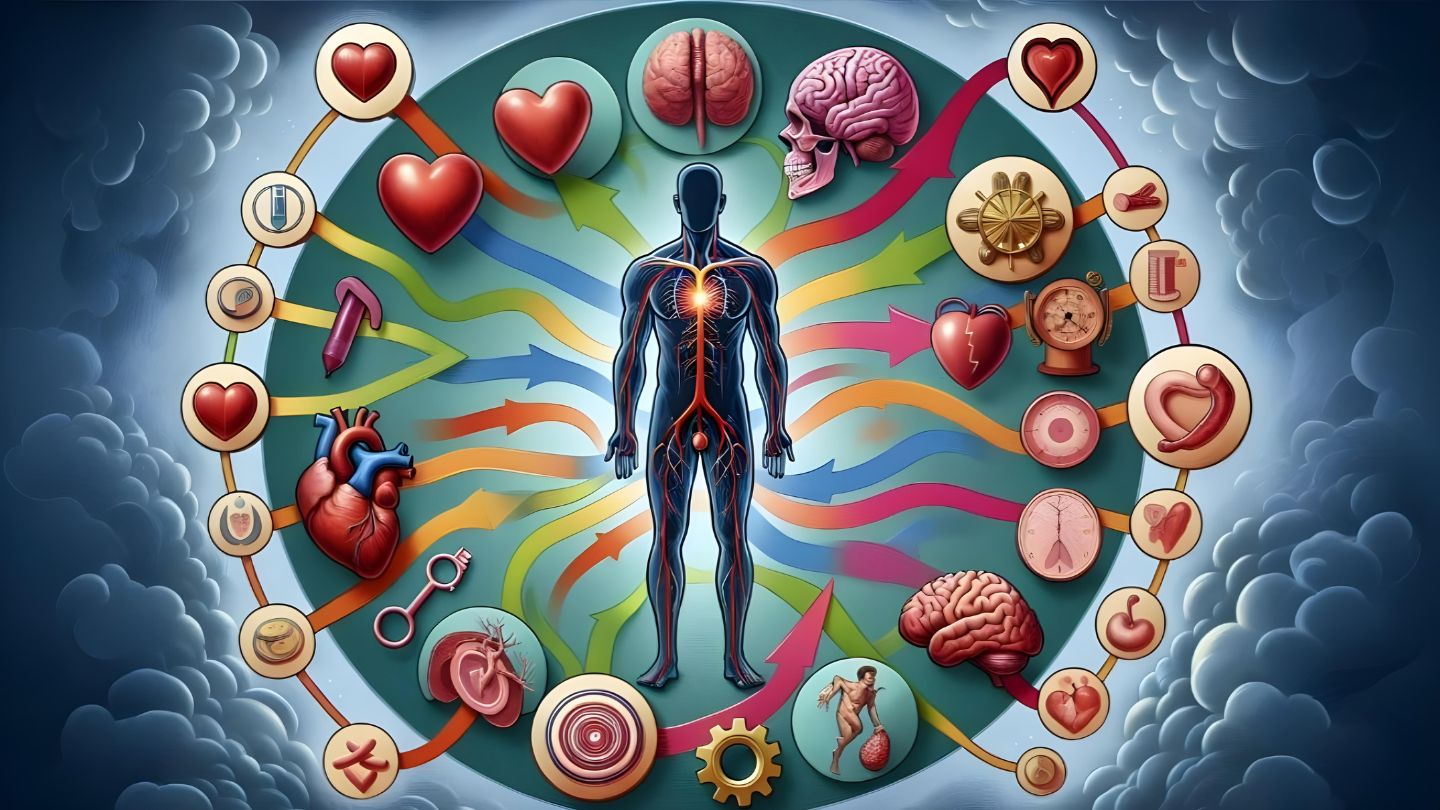If you often have trouble getting or keeping an erection or notice a drop in sexual interest, you might have erectile dysfunction. This article will help you identify common symptoms, understand possible causes, and consider treatment options.
Key Takeaways
- Erectile dysfunction (ED) is characterized by persistent difficulties in achieving or maintaining an erection, along with decreased sexual desire, and can stem from both physical and psychological factors.
- Identifying risk factors such as health conditions, medications, and lifestyle choices is crucial for managing ED and improving overall sexual health.
- Open communication with partners and timely professional consultation are key components in addressing ED, with early intervention leading to better management and recovery outcomes.
Recognizing Erectile Dysfunction Symptoms
Erectile dysfunction (ED), a form of male sexual dysfunction, is characterized by challenges in achieving or sustaining an erection adequate for gratifying sexual activity.
While occasional episodes of difficulty maintaining an erection do not automatically suggest erectile dysfunction, continuous sexual issues such as diminished libido may be indicative. The Massachusetts Male Aging Study revealed that approximately 52% of men between the ages of 40 and 70 have encountered ED at least once.
Common signs of ED
Persistent issues with attaining or sustaining erections during sexual encounters are typical indicators of erectile dysfunction (ED). A diminished libido is also often observed alongside these symptoms.
Such experiences can undermine self-esteem and the fulfillment derived from sexual activities. Prompt identification of these signs can facilitate early intervention, enhancing one’s sexual health.
Psychological Factors Affecting ED
The impact of psychological factors on erectile dysfunction is substantial. ED can be aggravated or potentially triggered by stress, anxiety, depression, and problems within personal relationships.
It is crucial to tackle mental health concerns in the management of ED. Effective strategies such as therapy, managing stress, and fostering clear communication with one’s partner are important for lessening the psychological effects on sexual health.
Identifying Risk Factors for Erectile Dysfunction
It is imperative to identify the risk factors associated with erectile dysfunction (ED) for effective management of this condition. ED may signal the presence of significant health concerns, including heart disease or diabetes. Those who experience consistent difficulties achieving an erection should seek advice from a healthcare provider.
Adopting regular exercise and maintaining a healthy lifestyle can diminish the likelihood of developing ED. Should there be a co-occurrence of other sexual issues, such as premature ejaculation or delayed ejaculation in conjunction with ED, it is advisable to consult a physician.
Health conditions and medications
Numerous health issues and medications may play a role in the development of ED. Conditions such as diabetes, high blood pressure, and heart disease can compromise vascular health and hinder proper blood flow, while diseases like atherosclerosis can significantly disrupt erectile function.
Medications, including antihistamines and antidepressants, are known to be contributing factors to ED. Long-standing health conditions like metabolic syndrome also have the potential to worsen this condition, underscoring the importance of effective management.
Lifestyle choices
Choices in one’s lifestyle can have a profound effect on erectile dysfunction. The constriction of blood vessels from smoking, along with the vascular complications it introduces, as well as the performance issues and reduced sexual desire stemming from heavy alcohol use, can aggravate ED.
Inactivity physically not only affects overall health but also hinders proper blood circulation, which is a contributing factor to erectile dysfunction. Seeking advice or treatment options for managing this condition from a healthcare provider may lead to an improvement through recommended lifestyle modifications or medical interventions.
Understanding the Causes of Erectile Dysfunction
Recognizing the complexity of erectile dysfunction necessitates looking into not only physiological factors, such as problems with blood flow, which are often at the heart of the issue for many men, but also considering significant contributing elements like mental health concerns and issues within one’s relationship.
A thorough strategy that encompasses both physical and psychological dimensions is crucial in adequately addressing and treating erectile dysfunction.
Physical causes
Abnormalities in the arteries or veins of the penis are frequently associated with physical triggers of erectile dysfunction (ED). ED can arise as an adverse reaction to several medications, such as beta-blockers, antidepressants, and anti-anxiety agents.
Imbalances in hormones may contribute to ED, too. These can be evaluated via tests that measure testosterone levels. To effectively control erectile dysfunction, it is vital to medically treat these underlying physical conditions.
Psychological causes
Stress, anxiety, frustration, and fatigue are psychological factors that can lead to ED. Depression and anxiety as mental health issues have a considerable effect on sexual performance by exacerbating the symptoms of ED.
Assessing the psychological aspects when diagnosing ED is crucial for identifying its underlying causes and creating successful treatment strategies.
Diagnosing Erectile Dysfunction
A comprehensive assessment for diagnosing erectile dysfunction (ED) encompasses a meticulous medical history and physical examination. It is critical to delve into the patient’s history to unearth potential causes, whereas examining the genitals during a physical exam aids in evaluating hormonal imbalances that might be contributing factors.
Medical history and physical examination
Gathering data on conditions that impact changes in sexual response and erectile function is essential for accurate diagnosis. Delving into a detailed sexual history may reveal underlying conditions, and it’s equally important to evaluate psychological factors that could influence performance and perceptions.
Consistent medical examinations are critical for tracking chronic illnesses that have the potential to lead to ED (erectile dysfunction).
Laboratory tests
Various laboratory examinations are essential in diagnosing erectile dysfunction (ED). A penile Doppler ultrasound is instrumental for evaluating the dynamics of blood flow, and a range of tests, including those that measure hormone levels, can pinpoint physiological contributors such as testosterone concentrations.
Treatment Options for Erectile Dysfunction
Addressing ED necessitates a comprehensive strategy that tackles both the psychological and physical elements of the condition. Depending on personal requirements and root causes, there are various treatment options available. Thus, effective management is contingent upon close cooperation with your healthcare provider.
Swift identification and intervention for ED can enhance recovery prospects as well as augment life quality in general.
Oral medications
Prescription drugs, such as oral medications, serve as a prevalent remedy for ED. Sildenafil, also recognized by its brand name Viagra, enables men to obtain an erection around 30 to 60 minutes following consumption.
Alternatively, Tadalafil provides a more extended period of action that persists from 24 to 36 hours. Modification of the dosage is sometimes required for maximum efficacy.
Hormone replacement therapy
If erectile dysfunction is due to low testosterone levels, testosterone replacement therapy might be suggested. This form of treatment aims to restore hormonal equilibrium and enhance erectile performance.
Penile implants and other surgical options
When treatments such as oral medications and hormone therapy do not yield results for ED, surgical interventions are explored. Penile implants, which involve the placement of devices into the penis during surgery, facilitate the ability to obtain an erection.
Penile implants come in two primary forms: those that inflate to provide an erection when desired and malleable rods that can be manually adjusted to the erect position. Vascular surgery might be suitable for individuals whose ED is a consequence of issues with blood flow.
Surgical remedies may offer a practical solution for men who experience profound ED that has considerably impacted their quality of life.
Preventing Erectile Dysfunction
Maintaining a healthy lifestyle and controlling any pre-existing health conditions are crucial in the prevention of ED. Lifestyle choices such as prolonged use of drugs and heavy drinking play a significant role in causing ED since excessive alcohol has temporary effects on erectile function by influencing the nervous system.
Being inactive is associated with an increased risk of ED because it adversely affects cardiovascular health. To help prevent ED, it is advisable to engage in regular physical activity, consume alcohol moderately, and steer clear of illicit drug use.
Healthy lifestyle changes
Consuming a balanced diet rich in whole foods such as fruits, vegetables, grains that are not processed, and fats that are beneficial for you can enhance the health of your blood vessels and decrease the possibility of erectile dysfunction. Embracing a diet similar to the Mediterranean style is specifically advantageous.
Engaging consistently in physical activity diminishes the chances of encountering ED. Both moderate levels and vigorous forms of exercise have been shown to offer protective benefits. It’s essential to keep one’s weight within healthy limits since obesity heightens the risk for erectile dysfunction.
Alleviating stress through regular physical activity and methods designed for relaxation can have a favorable effect on one’s sexual well-being, serving as preventive measures against erectile dysfunction.
Managing existing health conditions
Effective control of chronic conditions, such as diabetes and high blood pressure, is crucial for reducing the risk of erectile dysfunction (ED). Proper management can greatly decrease the chances of experiencing ED.
How to Talk About ED with Your Partner
Talking about erectile dysfunction with your significant other might be difficult, but it’s crucial for preserving a strong partnership. Stress and declines in self-confidence associated with ED can put pressure on relationships and may even play a role in exacerbating erectile dysfunction.
Issues related to mental health, such as anxiety, as well as difficulties within the relationship itself, can have profound effects on one’s ability to maintain an erection. Addressing ED promptly can bolster self-esteem and enhance the quality of the relationship.
Communicate openly
Engaging in discussions about sexual issues, like ED, in a relaxed environment can enhance communication. It’s beneficial when partners are transparent with each other regarding their emotions and worries related to these challenges.
By candidly talking about ED, both individuals may be motivated to pursue treatment as a team, which can deepen the emotional bond between them.
Seek professional help
Engaging a healthcare provider in discussions about erectile dysfunction (ED) can improve comprehension and aid in the treatment process. Seeking advice from a sex therapist may assist couples in uncovering fundamental problems and enhancing communication around sexuality.
When couples participate together in medical consultations, it bolsters their support network throughout the course of ED therapy, guaranteeing efficient interaction with the healthcare provider.
When to See a Doctor for Erectile Dysfunction
It is imperative to determine the underlying reasons for erectile dysfunction (ED) to ensure successful treatment. For those experiencing ongoing issues with achieving an erection, it is recommended they consult a healthcare professional. It’s beneficial when healthcare providers actively inquire about their patient’s sexual functions as this can assist in identifying the problem.
Should symptoms of ED arise, securing a timely appointment with a healthcare provider is strongly advised. Early intervention often enhances the ability to address any contributing health conditions and can lead to enhancements in sexual health overall.
Early intervention benefits
Identifying symptoms of erectile dysfunction (ED) promptly can enhance the control over associated health conditions such as heart disease. By acknowledging these signs at an early stage, individuals are able to seek immediate advice from a healthcare provider and expedite their treatment process.
Acting swiftly with appropriate treatments not only greatly boosts mental health and alleviates concerns about sexual performance but also increases the likelihood of successful therapy outcomes. This proactive approach hinders the Deterioration of sexual function, offering notable advantages for overall wellness, psychological resilience, and enriched relational fulfillment.
Finding the right healthcare provider
It is crucial to select a healthcare provider who specializes in sexual health and has ample experience with erectile dysfunction (ED) for successful management and treatment. Their methodology for addressing the condition should also be taken into account.
To locate such a qualified professional, one can consult online databases, seek out members from relevant medical societies or associations, or ask for referrals from their own doctor. Choosing an adept healthcare provider will greatly improve both the treatment journey and the results related to ED.
Atlanta Medical Institute
The Atlanta Medical Institute stands as a leading center focused on advancing regenerative medicine, weight management, sexual health for men and women, anti-aging techniques, and holistic wellness. Our tailored strategies encompass not only FDA-approved medications but also natural remedies and lifestyle modification guidance to ensure our patients attain their desired well-being objectives.
Dedicated to excellence in healthcare provision, the professional staff at the Atlanta Medical Institute is equipped to address various challenges, including erectile dysfunction, among other concerns. We are here to support you in your journey towards an enhanced quality of life.
We invite you to get in touch with us now for details about our offerings and discover how we can contribute to your pursuit of better health.
Summary
Erectile dysfunction is a complex condition with various symptoms, causes, and treatment options. By recognizing the signs early, identifying risk factors, and understanding the causes, you can take proactive steps toward managing and treating ED. Effective communication with your partner and seeking professional help are crucial for improving sexual health and relationship satisfaction.
At Atlanta Medical Institute, we offer a range of services to support your health and well-being. Whether you need medical treatments, lifestyle advice, or emotional support, our team is here to guide you every step of the way. Take control of your sexual health and start your journey towards a better quality of life today by exploring our erectile dysfunction treatment in Atlanta.
Frequently Asked Questions
What are the primary symptoms of erectile dysfunction?
Erectile dysfunction is characterized by the main symptoms of struggling to attain or sustain an erection, alongside unsatisfactory sexual performance, which can greatly affect both intimate relationships and one’s broader well-being.
How do psychological factors affect erectile dysfunction?
Mental health issues such as stress, anxiety, and depression can significantly exacerbate the severity of erectile dysfunction.
It is essential to tackle these psychological factors in order to enhance erectile function.
What are some common health conditions that contribute to ED?
Common health conditions such as diabetes, high blood pressure, heart disease, and atherosclerosis can obstruct proper blood flow and lead to erectile dysfunction.
It’s essential to tackle these root causes for the successful treatment of ED.
How can lifestyle changes help prevent erectile dysfunction?
Making healthy lifestyle changes, like exercising regularly and eating a balanced diet, can significantly reduce the risk of erectile dysfunction by enhancing overall health and blood flow.
Implementing moderation in alcohol intake and avoiding illicit drugs will further support your sexual health.
When should you see a doctor for erectile dysfunction?
You should see a doctor for erectile dysfunction if you have persistent difficulty getting or maintaining an erection.
Addressing this issue early can help manage underlying health problems and enhance your sexual health.









